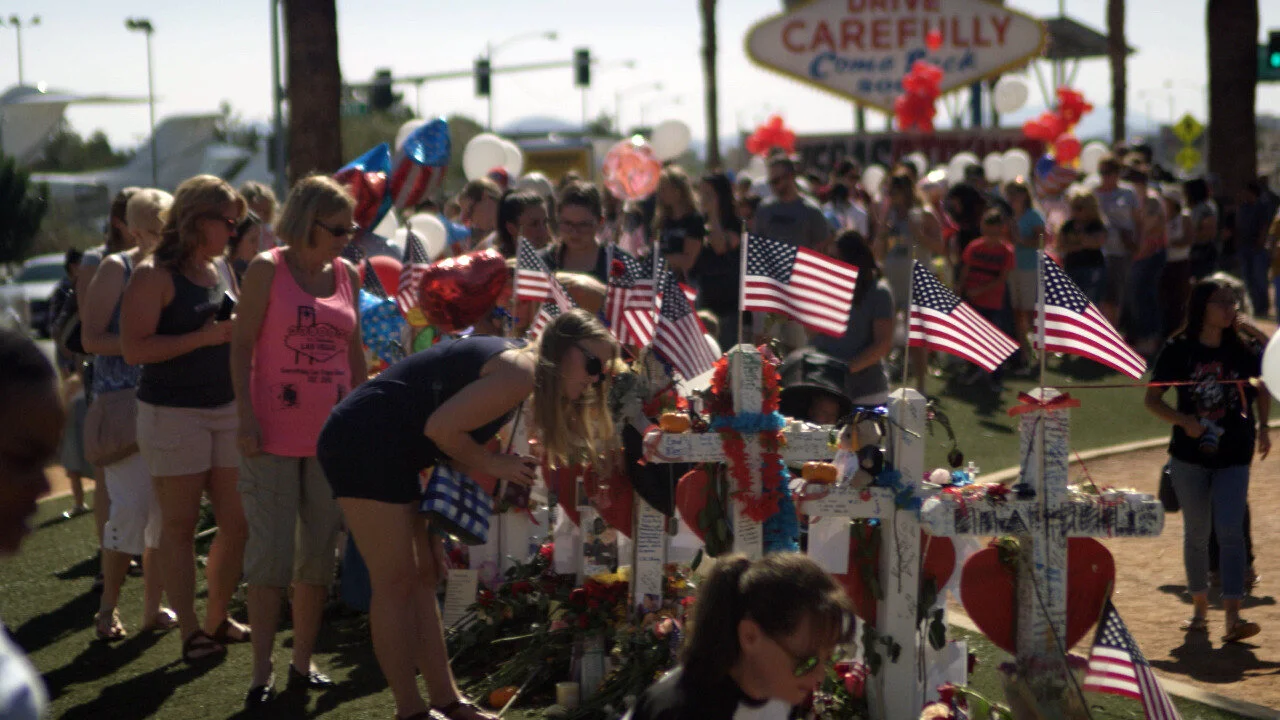Money Machine: Chronicle of Vegas Mass Shooting Neither Probing Nor Convincing
By Liam Lacey
Rating: C-
The murder of 58 people and injury of 800 more at a country music festival in Las Vegas in October, 2017 was a hideous event, as the opening minutes of Ramsey Denison’s documentary, Money Machine, graphically remind us.
What’s not so clear is the benefit of immersing us in this carnage in an angry, disjointed documentary that wobbles between high-minded outrage and crude tabloid sensationalism.
Using a compilation of smart-phone footage, surveillance videos, and police body cams, the film places us in the midst of the 22,000 people gathered at an outdoor concert around 10 pm at the closing act of a three-day country music festival.
Many were singing along to Jason Aldean’s “When She Says Baby” when the rat-a-tat-tat of an assault rifle began mixing with the on-stage drums. The killer, a 64-year-old gambler named Stephen Paddock, had taken two rooms on the 32nd floor of the MGM Mandalay Bay hotel and brought more than 20 weapons through the hotel’s service elevator to stage the massacre.
The subsequent film weaves together disparate, vaguely connected accusations of corporate influence, police incompetence, and cover-up. The numerous interviews include survivors of the shooting, investigative journalists, eyewitnesses, and various freelance “security” types.
Conspicuously missing from the interview slate are Sheriff Joe Lombardo and Nevada’s current Governor Steve Sisolak, who is accused of exploiting the tragedy for political purposes. Neither does the film speak to anyone from MGM, owners of the hotel, which Paddock used as his sniper’s nest.
Along the way, the documentary wastes time presenting survivors’ claims there were multiple shooters (there weren’t) or that it was a terrorist attack (it wasn’t). To pad the 74-minute running time is a history of Vegas, from its mob beginnings, to the family-fun eighties to its current profit-maximizing strategies. There are lots of quotes about how Vegas is “a town that knows how to make things disappear — money, people…” that would be better left to pulp fiction.
Someone even claim things were better in the old mob-run days, when troublemakers got buried in the desert… but you could leave your door unlocked. That was before the heartless corporations stepped in. The corporate culpability argument reaches its nadir with the interview with Paddock’s younger brother Eric, who says his brilliant sibling’s motive was rage that the casino hotels reneged on his comping privileges.
Otherwise, the film offers a blizzard of suppositions and questions from the serious to the absurd. Did the fact that policemen froze in fear on a floor below the shooter cause more deaths? Why were police ordered to turn off their bodycams? Was the security guard who was wounded, and rewarded by MGM, paid to not talk to the media? OK, he did do one softball interview on with Ellen Degeneres but as one investigator notes darkly, Degeneres has invested in a line of slot machines.
To be fair, the film also itemizes a litany of venality or incompetence by various parties: The hotel’s shoddy security, the sloppiness of the cops, a fundraising drive that mysteriously failed to pay out, the city’s token “memorial” site, placed far from sight in a suburb seven miles from the concert site. MGM even attempted to “sue” the victims to pre-empt any lawsuits, using a post-9/11 law freeing business of liability for terrorist violence. (The eventual settlement between MGM and the victims was reached for $800 million, mostly covered by insurance.)
But really. While there are multiple reasons for anger, is there anything actually shocking here? Corporate greed? A tourist town hurrying to paper over a tragedy? Or the U.S.’ pathological denial of its gun culture?
The documentary’s coda includes the infamous interview last April between CNN’s Anderson Cooper and the Las Vegas mayor Carolyn Goodman, who pushed to keep the city’s casinos open in the midst of the coronavirus pandemic. Though an extreme and easily ridiculed example, the mayor’s profit-before-lives policy is far from unique.
What happened in Vegas happens everywhere.
Money Machine. Directed by Ramsey Denison. Click here to purchase.


